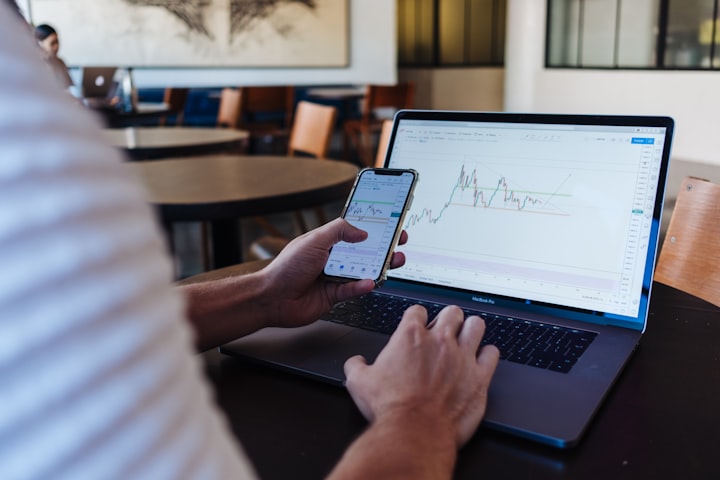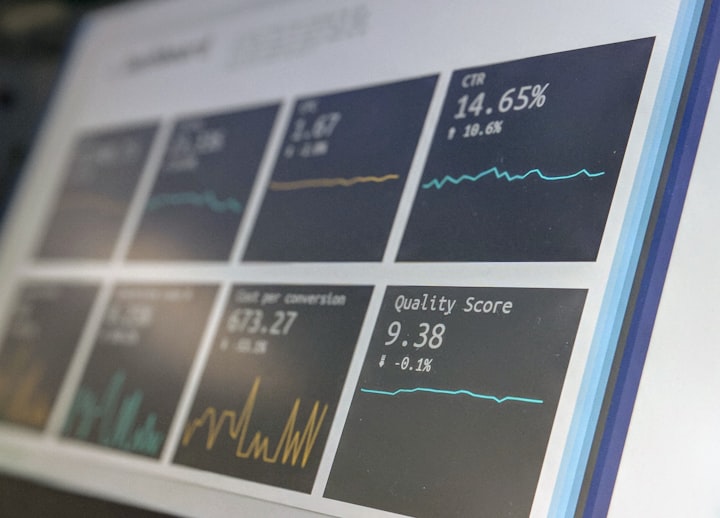Mastering Forex Trading A Beginner's Guide to Becoming a Pro new
Final chapter

Chapter 10: The Future of Forex Trading
Emerging trends in Forex Trading
The forex market is constantly evolving, and there are always emerging trends and developments that traders should be aware of. Here are some of the emerging trends in forex trading:
1. Mobile trading: With the increasing popularity of smartphones and tablets, more and more traders are using mobile devices to access the forex market. This trend is expected to continue, and brokers are responding by offering mobile trading platforms with advanced features.
2. Social trading: Social trading platforms allow traders to connect with each other, share trading ideas, and copy the trades of successful traders. This trend is growing in popularity, and many brokers now offer social trading platforms.
3. Algorithmic trading: Algorithmic trading, also known as automated trading, involves using computer algorithms to execute trades automatically based on predetermined criteria. This trend is growing in popularity as traders seek to take advantage of the speed and efficiency of computerized trading systems.
4. Cryptocurrency trading: Cryptocurrencies such as Bitcoin, Ethereum, and Litecoin are becoming increasingly popular as a trading instrument. Some brokers now offer trading in cryptocurrencies, either directly or through derivative products such as CFDs.
5. Artificial intelligence: Artificial intelligence (AI) is becoming increasingly important in forex trading. AI-powered trading systems can analyze vast amounts of data and make predictions based on complex algorithms. This trend is expected to continue, with AI playing an increasingly important role in forex trading.
In summary, the forex market is constantly evolving, and traders need to stay up-to-date with emerging trends and developments to stay competitive. By embracing new technologies and staying informed about the latest trends, traders can stay ahead of the curve and succeed in the forex market.
The impact of technology on Forex Trading
Technology has had a significant impact on forex trading, revolutionizing the way traders analyze the markets, execute trades, and manage their portfolios. Here are some of the ways technology has transformed forex trading:
1. Access to real-time market data: With the advent of the internet and electronic trading platforms, traders now have access to real-time market data from around the world. This has made it easier for traders to analyze the markets and make informed trading decisions.
2. Automated trading: Automated trading systems, also known as algorithmic trading, use computer algorithms to execute trades automatically based on pre-determined criteria. This has made it possible for traders to execute trades quickly and efficiently, without the need for human intervention.
3. Trading platforms: Trading platforms have become more sophisticated, with advanced charting tools, real-time news feeds, and social trading features. This has made it easier for traders to analyze the markets and share trading ideas with other traders.
4. Mobile trading: The rise of mobile technology has made it possible for traders to access the forex market from anywhere, at any time. Mobile trading platforms are now available for smartphones and tablets, allowing traders to stay connected to the markets while on the go.
5. Artificial intelligence: Artificial intelligence (AI) is becoming increasingly important in forex trading, with AI-powered systems able to analyze vast amounts of data and make predictions based on complex algorithms.
In summary, technology has had a profound impact on forex trading, making it easier and more efficient for traders to access the markets, analyze data, and execute trades. As technology continues to evolve, we can expect to see further innovation in the forex trading industry.
Regulatory changes and their effects on Forex Trading
Regulatory changes have had a significant impact on forex trading, shaping the industry and affecting the way traders operate. Here are some examples of regulatory changes and their effects on forex trading:
1. Increased regulation: In the wake of the 2008 financial crisis, regulators around the world increased their oversight of the financial industry, including the forex market. This has led to tighter regulations and increased compliance requirements for forex brokers and traders.
2. Leverage limits: Many regulators have introduced limits on the amount of leverage that forex brokers can offer their clients. This has reduced the amount of risk that traders can take on, but has also made it harder for traders to generate large profits.
3. Client fund protection: Regulators have also introduced rules to protect client funds, such as requiring brokers to keep client funds in segregated accounts and implementing compensation schemes for investors in the event of a broker's insolvency.
4. Reporting requirements: Regulators require brokers to provide regular reports on their financial status, client funds, and trading activities. This provides transparency and helps to prevent fraud and misconduct.
5. Country-specific regulations: Different countries have different regulatory frameworks for forex trading, which can impact traders operating in those countries. For example, the European Securities and Markets Authority (ESMA) has introduced tighter regulations on forex trading in the European Union, which has affected the way traders in that region operate.
In summary, regulatory changes have had a significant impact on forex trading, with tighter regulations and increased compliance requirements affecting the way traders operate. While these changes have increased transparency and protected investors, they have also made it harder for traders to generate large profits and may limit the potential for innovation in the industry.
Forex trading can be a lucrative career for those who are willing to put in the time, effort, and discipline to become a professional trader. The potential for high profits and the flexibility to work from anywhere in the world make it an attractive option for many individuals.
Conclusion: Forex Trading as a Career
To become a professional trader, it is important to have a solid understanding of the fundamentals of forex trading, including technical and fundamental analysis, risk management, and trading psychology. It is also important to develop a trading plan and strategy that fits with your personal goals and risk tolerance.
Education and continuous learning are critical for success in forex trading. This includes staying up to date with the latest market developments, trends, and regulations. Many traders also choose to pursue certifications or advanced degrees in finance or related fields to enhance their skills and credibility.
To start a career in forex trading, individuals can begin by opening a demo trading account to practice their skills and test out strategies without risking real money. From there, they can progress to a live trading account with a reputable broker.
Discipline is crucial in forex trading, as emotions can easily cloud judgement and lead to costly mistakes. It is important to have a plan in place for managing risk, setting goals, and sticking to a trading strategy.
In conclusion, forex trading can be a rewarding career for those who are willing to put in the time and effort to develop the necessary skills and discipline. Continuous learning and staying up to date with market developments are key to success in this dynamic and exciting field.
About the Creator
Afsal Shaji
story teller from india






Comments
There are no comments for this story
Be the first to respond and start the conversation.